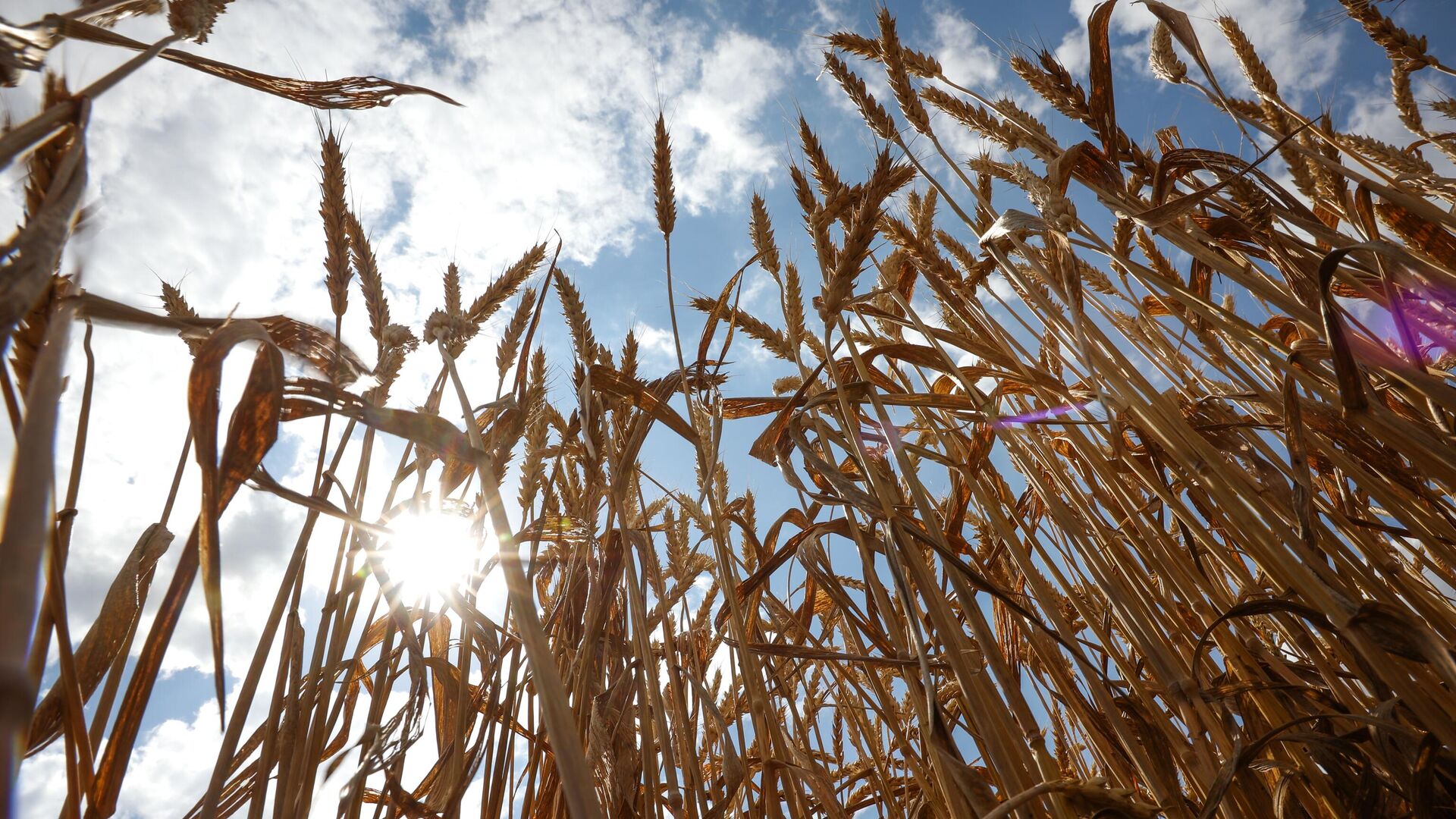https://sputniknews.in/20230719/what-stopped-russia-from-extending-black-sea-grain-deal-3079854.html
What Stopped Russia From Extending Black Sea Grain Deal?
What Stopped Russia From Extending Black Sea Grain Deal?
Sputnik India
New Delhi has backed efforts to continue the Black Sea Grain Initiative and has called for an “early resolution to the current impasse” after Moscow objected to extend the pact beyond 18 July.
2023-07-19T17:10+0530
2023-07-19T17:10+0530
2023-07-19T17:10+0530
ukraine conflict
black sea initiative (grain deal)
black sea
russia
india
ukraine
fertilizers
food security
wheat export
sergey lavrov
https://cdn1.img.sputniknews.in/img/07e7/07/13/3081479_0:0:3072:1728_1920x0_80_0_0_61a7146c8474ed99dbca4f6ed990017c.jpg
Moscow has refused to extend the ‘Black Sea Grain Initiative’ over the West's failure to fulfill its commitments on facilitating the export of Russian foodgrains and fertilizers to global markets, which was one of the two key elements of the pact signed last July.The Black Sea Grain Deal allowed for the “resumption” of Ukrainian grain exports from the Black Sea ports of Odessa, Chornomorsk, Yuzhny/Pivdennyi, according to information available with the United Nations.The deal between Russia and Ukraine, brokered by Turkiye and the United Nations Secretary-General Antonio Guterres, was signed in Istanbul last July.In return, Moscow agreed to provide security guarantees for safe transportation of Ukrainian grain, sunflower oil and fertilizers through the so-called ‘Black Sea Grain Corridor’, which falls under the jurisdiction of the special military operation.According to various estimates, Russia and Ukraine accounted for almost 30 percent of global wheat exports before Moscow launched its operation last February.The disruption in supplies since last year caused global wheat prices to hit a 14-year-high, affecting food security globally, but most prominently in the Global South.However, Kremlin spokesperson Dmitry Peskov has said that the world’s poorest countries received the “least from the grain deal”, while Kiev exploited the deal for its own “military purposes."How Much Grain Was Transported?According to the Russian Foreign Ministry, nearly 32.6 million tonnes of grain were exported from the three Ukrainian ports since last August after the grain deal was implemented.Gennady Gatilov, Russia’s permanent representative to the UN, has said that the deal has “turned into a commercial project for the benefit of wealthy countries and Ukraine," according to his remarks published by the Foreign Ministry.Moscow has said that despite an ongoing fertilizer crisis in the low and middle-income countries, Kiev first blocked and then blew up the Tolyatti-Odessa ammonia pipeline.What Did Russia-UN Memorandum Provide for?The Russian Foreign Ministry has said that none of the five commitments made to Moscow at the time of signing the grain deal have been fulfilled.Russian Foreign Minister Sergey Lavrov told Turkish counterpart Hakan Fidan in a telephone call on Tuesday that Russian bank payments, insurance and transport logistics continue to remain “blocked” due to western sanctions.Lavrov said that supplies of Russian agricultural products and fertilizers to the global markets remained frozen.
https://sputniknews.in/20230718/ukraine-uses-grain-deal-for-military-ends-kremlin-3070798.html
black sea
russia
india
ukraine
turkiye
Sputnik India
feedback.hindi@sputniknews.com
+74956456601
MIA „Rossiya Segodnya“
2023
Dhairya Maheshwari
https://cdn1.img.sputniknews.in/img/07e6/0c/13/138962_0:0:641:640_100x100_80_0_0_2cb44360dbcdf6d84bf4b299cd045917.jpg
Dhairya Maheshwari
https://cdn1.img.sputniknews.in/img/07e6/0c/13/138962_0:0:641:640_100x100_80_0_0_2cb44360dbcdf6d84bf4b299cd045917.jpg
News
en_IN
Sputnik India
feedback.hindi@sputniknews.com
+74956456601
MIA „Rossiya Segodnya“
Sputnik India
feedback.hindi@sputniknews.com
+74956456601
MIA „Rossiya Segodnya“
Dhairya Maheshwari
https://cdn1.img.sputniknews.in/img/07e6/0c/13/138962_0:0:641:640_100x100_80_0_0_2cb44360dbcdf6d84bf4b299cd045917.jpg
ukraine news, ukraine russia, ukraine map, ukraine russia news, russia grain production,, russia ukraine news, black sea grain initiative, wheat production in russia, wheat price in russia, wheat futures
ukraine news, ukraine russia, ukraine map, ukraine russia news, russia grain production,, russia ukraine news, black sea grain initiative, wheat production in russia, wheat price in russia, wheat futures
What Stopped Russia From Extending Black Sea Grain Deal?
New Delhi has backed efforts to continue the Black Sea Grain Initiative and called for an “early resolution to the current impasse” after Moscow objected to extending the pact beyond July 18.
Moscow has
refused to extend the ‘Black Sea Grain Initiative’ over the West's failure to fulfill its commitments on facilitating the export of Russian foodgrains and fertilizers to global markets, which was one of the two key elements of the pact signed last July.
The Black Sea Grain Deal allowed for the “resumption” of Ukrainian grain exports from the Black Sea ports of Odessa, Chornomorsk, Yuzhny/Pivdennyi, according to information available with the United Nations.
The deal between Russia and Ukraine, brokered by Turkiye and the United Nations Secretary-General Antonio Guterres, was signed in Istanbul last July.
Under the Russia-UN memorandum signed at the time, a key condition for the smooth implementation of the grain deal was guarantees that Russian food and fertilizers would also be allowed to reach the global markets.
In return, Moscow agreed to provide security guarantees for safe transportation of Ukrainian grain, sunflower oil and fertilizers through the so-called ‘Black Sea Grain Corridor’, which falls under the jurisdiction of the special military operation.
According to various estimates, Russia and Ukraine accounted for almost 30 percent of global wheat exports before Moscow launched its operation last February.
The disruption in supplies since last year
caused global wheat prices to hit a 14-year-high, affecting food security globally, but most prominently in the Global South.
However, Kremlin spokesperson Dmitry Peskov has said that the world’s poorest countries received the “least from the grain deal”, while Kiev exploited the deal for its own “military purposes."
How Much Grain Was Transported?
According to the Russian Foreign Ministry, nearly 32.6 million tonnes of grain were exported from the three Ukrainian ports since last August after the grain deal was implemented.
However, Moscow has said that the “poorest countries” in Africa, Asia and South America received just 2.6 percent of these exports. More than 26 million tonnes of Ukrainian grains, comprising 81 percent of the overall exports, were dispatched to the nations with “high or higher-than-average level of incomes."
Gennady Gatilov, Russia’s permanent representative to the UN, has said that the deal has “turned into a commercial project for the benefit of wealthy countries and Ukraine," according to his remarks published by the Foreign Ministry.
Moscow has said that despite an ongoing fertilizer crisis in the low and middle-income countries, Kiev first blocked and then blew up the Tolyatti-Odessa ammonia pipeline.
What Did Russia-UN Memorandum Provide for?
The Russian Foreign Ministry has said that none of the five commitments made to Moscow at the time of signing the grain deal have been fulfilled.
It underlined that these conditions were “reconnecting Rosselkhozbank to SWIFT, resuming the supplies of spare parts for agricultural machinery, reviving the Togliatti-Odessa ammonia pipeline, making arrangements for transport logistics and insurance, and unfreezing financial assets," an official statement said.
Russian Foreign Minister Sergey Lavrov told Turkish counterpart Hakan Fidan in a telephone call on Tuesday that Russian bank payments, insurance and transport logistics continue to remain “blocked” due to western sanctions.
Lavrov said that supplies of Russian agricultural products and fertilizers to the global markets remained frozen.
The top Russian diplomat said that Moscow would rescind its “safe navigation guarantees” in the Black Sea, “restore the temporary danger area status” and “dismantle the humanitarian sea corridor” established last year, according to the Russian Foreign Ministry.



